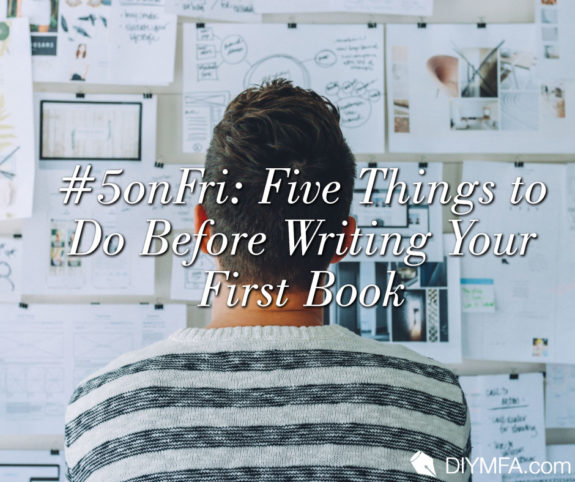You’re excited. You’ve decided to take on a new project. The idea has been stirring in your head for years and you’re finally going to do it. You’re going to write a book—
Now what?
Writing a book is a huge undertaking. It took ten years and countless revisions to get my own book published. Here are some things I wish someone had told me to do when I was first starting out writing my novel.
1. Start Small
Writing can be very difficult, especially if it’s a skill you never really learned in the first place. My family moved so frequently and I went to so many different high schools, that I somehow missed all the fundamentals. In college, I barely made it through Freshman Composition. In business classes, I came to understand that writing is all about clarity and precision. I learned to make detailed outlines and fill the rest in with bullets.
So, when I sat down to begin my book, I started with what I knew—an outline annotated with questions, ideas, and lots of bullets. After months of working on this outline, I realized that I might just be adding bullets forever. The outline had turned into a procrastination tool. Enough was enough. It was time to start writing.
But trying to get words on the page paralyzed me. I’d sit in front of the computer for hours, laboring over every word. Even so, nothing I wrote was good enough. I’d spend a day writing a paragraph and then erase it. “Just get something down,” I told myself. “You can go back and fix it later.” But I was so caught up in how every sentence and paragraph fit within my outline that I had myself stuck. My husband, Marc, helped me break the cycle. He told me, “Just tell your story.” And those four little words snapped me out of my rut.
You can start by identifying one key story you want to tell and concentrate on getting it down on paper. Rather than fretting that the story is out of sequence, or wondering if it contributes to the story arc, character development, theme, etc., just get an anecdote on paper. Freed from the pressure of “The Book,” you can show yourself that you can, in fact, write. These small victories will give you the confidence to move forward and save you a lot of agony.
2. Figure Out Your Motivations
As with any creative endeavor, you can keep the project to yourself or you can tell absolutely everyone about it. When I finally started getting words on the page and the number of pages grew, I couldn’t contain my excitement. I started telling family and close friends that I was writing a book. But I didn’t think about what I was getting myself into.
As time passed, they’d ask “When do you think you’ll be done with the book?” and “When can I read it?” Every time they did, I was filled with anxiety. These were questions I was already asking myself and the same inquiries from family and friends proved to be too much pressure. So much so that I quit writing—twice.
When I started back up the second time, I didn’t tell anyone, not even my husband, that I was back at it. Though it was too much pressure for me to field questions about the status of my book, you may find those questions motivating. Figure out if questions from friends and family about the status of your book will be paralyzing or invigorating and proceed accordingly.
3. Do Your Homework, Then Stop
Before I sat down in front of the computer to begin writing my book, I read. A lot. While it may seem funny to perform research for a memoir (after all, who could be more of an expert on the subject of my life than me?), I wanted to familiarize myself with as many different approaches to memoir as possible. I read every type of memoir I could get my hands on.
While I read, I took notes on how the authors dealt with sensitive material, particularly domestic abuse, which was at the heart of my story. I also observed how they described love-hate family relationships, something that I also planned to write about. In other words, I read other memoirs not only because that was my genre but also so I could get a sense of how to approach the parts of my story that I knew would be most difficult for me to tell.
Then, once I started writing, I stopped reading. I wanted to make sure that my book was my own, informed by memoirists before me but not mimicking their work. Make sure you do your homework but also know when to stop and get to the actual writing.
4. Develop a Realistic Writing Schedule
When I started my book, I planned to finish writing it in a year. I didn’t think about how much this would require me to actually write every day. And I certainly didn’t account for editing. As the weeks and months passed, my overly ambitious timeline only added additional unnecessary stress to an already difficult process.
Give yourself a more realistic timeline by measuring your typical progress each week and accounting for your likely already busy schedule. Also, build in time for revisions. I wasn’t prepared, nor did I understand the number of times I would have to touch and retouch my book. Many times I said, “Okay, I’m done,” only to be told by a reviewer, my editor, or my publisher that there were more edits to make. It all made my book better; I just never anticipated so much time being needed to complete the whole process.
5. Allow Criticism to Embolden You
When I was working on my book, every author, agent, and publisher I spoke with told me that I had better have thick skin. They were right. From the beginning, I knew I’d have to steel myself when I showed my book to an editor. But I didn’t expect I’d need to do the same with family and friends.
Many writers have family members who say things like “you’re not an MFA or even an English major” and “real novelists spend years studying and perfecting their craft.” Or the really hard-hitting one, “do you know that only an infinitesimal number of manuscripts actually get published?” Of course, we all know these are partially true. But still, criticism is hard to hear.
After I had completed a rough draft of my manuscript, I began looking for an editor. The first one who read the manuscript told me my book was awful. “It’s so bad,” he wrote, “you need to put it in a box and shove it under your bed.” I couldn’t get these words out of my head. But every time I played them over and over, they stung a little less. Allow criticism to feed you. Be determined to prove them wrong; be emboldened by it.

Teressa Shelton has lived in nine states and three countries. After graduating from Belmont University in Nashville, she embarked on a career in managing medical practices. The Sergeant’s Daughter (August 2020) is her first book. She lives with her family in Springfield, IL.







